By Andrew Willis Garces, in consultation with many others
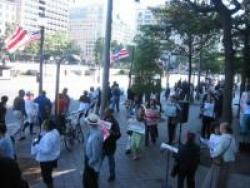 IN THE SMALL second-floor conference room above the takeout place, or in somebody’s living room, a church basement, the stoop of an apartment building, that’s where you’ll find them, sipping cups of tea to fight off the November chill. Mothers, grandmothers, great-granddaughters. Childcare providers, students, retirees, teachers, videographers, office workers, chefs, folks between jobs. They’ve lived here all their lives, or seventeen years, or only six months. Their families arrived long ago from South Carolina, El Salvador, Lebanon, Ethiopia, settling in Bellevue, Congress Heights, Garfield Terrace, 14th Street Heights, Ivy City. They’re taking notes, sharing meals, debriefing from that meeting with the city official, going over their goals, making phone calls to the folks who signed the petition last week, planning for the Next. Big. Action. Celebrating hard-won victories, and taking note of what they could have done better. These are activists and organizers, people who love DC and have come together to make it better. They’re fighting for workplace dignity, housing justice, safer streets for youth, women and recent immigrants, and stronger neighborhoods. They’re taking action together, and creating opportunities for more and more of us to get involved.
IN THE SMALL second-floor conference room above the takeout place, or in somebody’s living room, a church basement, the stoop of an apartment building, that’s where you’ll find them, sipping cups of tea to fight off the November chill. Mothers, grandmothers, great-granddaughters. Childcare providers, students, retirees, teachers, videographers, office workers, chefs, folks between jobs. They’ve lived here all their lives, or seventeen years, or only six months. Their families arrived long ago from South Carolina, El Salvador, Lebanon, Ethiopia, settling in Bellevue, Congress Heights, Garfield Terrace, 14th Street Heights, Ivy City. They’re taking notes, sharing meals, debriefing from that meeting with the city official, going over their goals, making phone calls to the folks who signed the petition last week, planning for the Next. Big. Action. Celebrating hard-won victories, and taking note of what they could have done better. These are activists and organizers, people who love DC and have come together to make it better. They’re fighting for workplace dignity, housing justice, safer streets for youth, women and recent immigrants, and stronger neighborhoods. They’re taking action together, and creating opportunities for more and more of us to get involved.
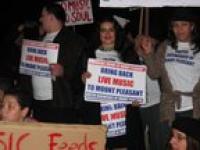 This list is a snapshot of the organizing victories won in 2007 by groups of people working for a concrete change to bring about a more just DC. I put it together, with a lot of help, as a document and a reminder, for all of us who join in struggle, envisioning a District more hospitable to working families, recent immigrants, native Washingtonians who know they have no choice but to take to the streets to claim their right to remain. The list documents the work of groups winning victories through campaigns, or a series of actions taken to achieve a shared goal. It’s only a start – it isn’t comprehensive. I invite others to contribute – posting additions or edits – by writing to willisa [at] gmail [dot] com. Thanks to DC JwJ hosting it here we can keep adding to it.
This list is a snapshot of the organizing victories won in 2007 by groups of people working for a concrete change to bring about a more just DC. I put it together, with a lot of help, as a document and a reminder, for all of us who join in struggle, envisioning a District more hospitable to working families, recent immigrants, native Washingtonians who know they have no choice but to take to the streets to claim their right to remain. The list documents the work of groups winning victories through campaigns, or a series of actions taken to achieve a shared goal. It’s only a start – it isn’t comprehensive. I invite others to contribute – posting additions or edits – by writing to willisa [at] gmail [dot] com. Thanks to DC JwJ hosting it here we can keep adding to it.
As a final note, I’m writing this to spotlight groups taking action towards change at the local level. I want to acknowledge there are lots of us also doing good work locally on issues that transcend geography. Like the hundreds of actions taken by residents in support of comprehensive immigration reform, justice for political prisoners and survivors of racist violence and police brutality in the US and abroad, and against war and militarism, to name just a few issues that require local, regional, national and global attention. I hope you’ll take a minute to let me know what you think of all this segmenting, categorizing and disclaiming, and offer up a few suggestions for making it more accessible, comprehensive and fair to folks doing great work. Here’s to a successful 2008 for all of us.
*Andrew is a District resident and organizer with DC JwJ coalition member ONE DC. The analysis presented here does not necessarily reflect the views of DC Jobs with Justice or any of its member organizations.
- Consumer Justice
- Housing/Gentrification
- Labor/Employment
- Education & Schools
- Police Accountability
- Health
- AROUND THE BLOCK: Neighborhood Victory Stories
- ONE DC Members, Shaw Residents Get a Guarantee
- Tenants Unite to Defeat Tenacity Group
- Hear Mt. Pleasant Stops an Eviction, and Reframes the Debate
CONSUMER JUSTICE
Winning a Fair Payday Lending Act
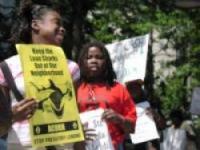 In September fair lending advocates including DC ACORN, Plymouth Congregational’s Board of Social Action and other DC Jobs with Justice members secured the passage of the Payday Lending Act, which requires payday loan stores to charge the same interest rate as banks and credit unions. Activists overcame the considerable lobbying muscle of payday lending business owners, who spent an untold sum in a frantic PR effort to lobby the City Council throughout the summer. The new law caps payday lending rates at 24%, whereas before payday lenders had been authorized to charge 350-550%, and DC borrowers had paid $3 million a year in fees for loans they couldn’t afford to pay off without taking on another loan.
In September fair lending advocates including DC ACORN, Plymouth Congregational’s Board of Social Action and other DC Jobs with Justice members secured the passage of the Payday Lending Act, which requires payday loan stores to charge the same interest rate as banks and credit unions. Activists overcame the considerable lobbying muscle of payday lending business owners, who spent an untold sum in a frantic PR effort to lobby the City Council throughout the summer. The new law caps payday lending rates at 24%, whereas before payday lenders had been authorized to charge 350-550%, and DC borrowers had paid $3 million a year in fees for loans they couldn’t afford to pay off without taking on another loan.HOUSING/ANTI-GENTRIFICATION
Tenants Stop Mass Condo Conversions
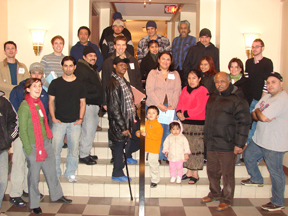 In January 2006 Tenacity Group, the condo people, sent letters to approximately 1,000 families living at 19 buildings proposing to convert their affordable rental housing into market-rate condominiums. Working with organizers at the Latino Economic Development Corporation and Housing Counseling Services, who coordinated marathon tenant meetings, the tenants learned about the implications of the conversion notices and DC’s “Right of First Refusal” law. Many also shared their insights with other tenants, and organized citywide events to raise awareness of Tenacity’s tactics. The result: No successful new conversions or tenants displaced. At the end of 2007 many of the buildings were up for sale, and tenants were exercising the opportunity to purchase the buildings as limited-equity cooperatives. These tenant associations are in a great position entering 2008: Aware of their rights, networked through regular leadership workshops with other tenant leaders, with taking action together and organizing for change.
In January 2006 Tenacity Group, the condo people, sent letters to approximately 1,000 families living at 19 buildings proposing to convert their affordable rental housing into market-rate condominiums. Working with organizers at the Latino Economic Development Corporation and Housing Counseling Services, who coordinated marathon tenant meetings, the tenants learned about the implications of the conversion notices and DC’s “Right of First Refusal” law. Many also shared their insights with other tenants, and organized citywide events to raise awareness of Tenacity’s tactics. The result: No successful new conversions or tenants displaced. At the end of 2007 many of the buildings were up for sale, and tenants were exercising the opportunity to purchase the buildings as limited-equity cooperatives. These tenant associations are in a great position entering 2008: Aware of their rights, networked through regular leadership workshops with other tenant leaders, with taking action together and organizing for change.Tenants Purchase Their Buildings
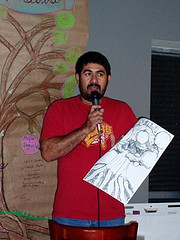 Many tenants exercised their first right to purchase in 2007, partnering in many cases with nonprofits that provide technical assistance to buy out their landlords and become coop owners. The tenants raise money for purchase from public and private sources, including the Housing Production Trust Fund, which collects a portion of real estate taxes to produce new affordable units. (The HPTF was the product of a campaign won by housing activists in 2002.) One such tenant group is 1333 Peabody St NW, the Peabody Cooperative. The Peabody is a 15-unit building with African and Latino tenants from seven countries who decided to purchase their apartments as a limited equity cooperative, ensuring it will be affordable for at least 50 more years. Tenants – now coop owners – committed hundreds of hours to the research and relationship building necessary to achieve this victory for collective wealth creation, partnering with LEDC to make their dream a reality.
Many tenants exercised their first right to purchase in 2007, partnering in many cases with nonprofits that provide technical assistance to buy out their landlords and become coop owners. The tenants raise money for purchase from public and private sources, including the Housing Production Trust Fund, which collects a portion of real estate taxes to produce new affordable units. (The HPTF was the product of a campaign won by housing activists in 2002.) One such tenant group is 1333 Peabody St NW, the Peabody Cooperative. The Peabody is a 15-unit building with African and Latino tenants from seven countries who decided to purchase their apartments as a limited equity cooperative, ensuring it will be affordable for at least 50 more years. Tenants – now coop owners – committed hundreds of hours to the research and relationship building necessary to achieve this victory for collective wealth creation, partnering with LEDC to make their dream a reality.FLY: Barry Farms Youth Envision the Future of Public Housing In December Facilitating Leadership in Youth – whose members are mostly Barry Farms Dwellings and Parkchester Coop residents – held their second annual youth retreat to develop analysis and youth vision for the redevelopment of the neighborhood. The group released their report from the first retreat in January detailing their vision for a family-friendly Barry Farms and concrete proposals for decision-makers. FLY youth leaders built on this vision throughout the year, convening the Barry Farms Coalition with local allies like ONE DC, Empower DC and the Far Southeast Family Strengthening Collaborative to support resident self-determination as a vehicle for “development without displacement,” and organizing several teach-ins and community forums on the proposed redevelopment.
Hear Mt. Pleasant: Standing Up for Latino Businesses & Live Music
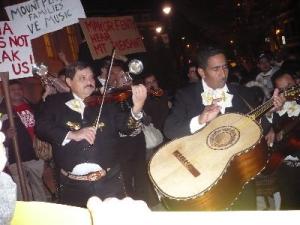 For several years a handful of Mt. Pleasant homeowners have used an archaic legal process to effectively ban live music from Mt. Pleasant Street, part of a trend some have named cultural gentrification. Much of the debate around the issue has been thinly disguised classism toward immigrant Latinos; several Latino-owned businesses on Mt. Pleasant Street comprise much of the recent historic cultural identity of the neighborhood. Last November a group of passionate, creative residents took on the hegemony of this handful with an engaging campaign that did much to foster close relationships and solidarity between the diverse communities of their neighborhood and win restored cultural protections for neighborhood establishments through activities like concerts, film screenings, workshops and puppet shows, in addition to advocacy of a new live music policy. The campaign reached a critical point November 19th when Laurie Collins, architect of the live music ban, attempted to have part of Don Juan’s Restaurant destroyed by the Department of Transportation. Residents began an emergency sit-in and mobilized over 400 people to attend a rally that night outside a meeting of the Mt. Pleasant Neighborhood Alliance, where Mayor Fenty and Councilmember Graham pledged their support for HMP.
For several years a handful of Mt. Pleasant homeowners have used an archaic legal process to effectively ban live music from Mt. Pleasant Street, part of a trend some have named cultural gentrification. Much of the debate around the issue has been thinly disguised classism toward immigrant Latinos; several Latino-owned businesses on Mt. Pleasant Street comprise much of the recent historic cultural identity of the neighborhood. Last November a group of passionate, creative residents took on the hegemony of this handful with an engaging campaign that did much to foster close relationships and solidarity between the diverse communities of their neighborhood and win restored cultural protections for neighborhood establishments through activities like concerts, film screenings, workshops and puppet shows, in addition to advocacy of a new live music policy. The campaign reached a critical point November 19th when Laurie Collins, architect of the live music ban, attempted to have part of Don Juan’s Restaurant destroyed by the Department of Transportation. Residents began an emergency sit-in and mobilized over 400 people to attend a rally that night outside a meeting of the Mt. Pleasant Neighborhood Alliance, where Mayor Fenty and Councilmember Graham pledged their support for HMP.People’s Property Campaign: Public Assets for the People, Not for Profit
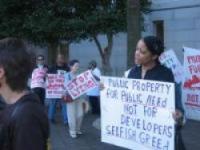 Empower DC‘s People’s Property Campaign made headway in its third year, creating a Public Property Bill of Rights and winning endorsement from numerous ANCs and other groups. The campaign received a boost in June, when the City Council quietly agreed to let Mayor Fenty give away the West End Library to a developer to construct new housing and retail. The huge outcry that followed — many rallies, accountability sessions with Councilmember Jack Evans who, confronted by angry voters, apologized and promised to work to undo the giveaway — fueled participation in a huge early morning rally in September at the City Council that drew over 150 residents. Spurred on by Empower DC activists, in December Councilmember Harry Thomas introduced legislation to reform the DC Code to make it more difficult to give away public property, and create accountability to local community needs (like affordable housing, shelters, community spaces) instead of the political priorities of mayors and councilmembers or the motives of for-profit developers.
Empower DC‘s People’s Property Campaign made headway in its third year, creating a Public Property Bill of Rights and winning endorsement from numerous ANCs and other groups. The campaign received a boost in June, when the City Council quietly agreed to let Mayor Fenty give away the West End Library to a developer to construct new housing and retail. The huge outcry that followed — many rallies, accountability sessions with Councilmember Jack Evans who, confronted by angry voters, apologized and promised to work to undo the giveaway — fueled participation in a huge early morning rally in September at the City Council that drew over 150 residents. Spurred on by Empower DC activists, in December Councilmember Harry Thomas introduced legislation to reform the DC Code to make it more difficult to give away public property, and create accountability to local community needs (like affordable housing, shelters, community spaces) instead of the political priorities of mayors and councilmembers or the motives of for-profit developers.ONE DC: Resident-Led Development of New Low-Income Housing
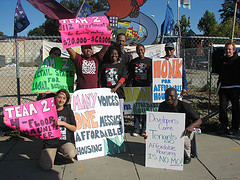 ONE DC‘s ONE Right to Land group capped a five-year campaign to win new, permanently affordable housing at a city-owned lot at 7th St NW and R St NW. Shaw residents, ONE DC members, some of whom had been forced from the neighborhood by rising rents, secured guarantees of a $7.8 million subsidy for the development in July after threatening to occupy the Executive Suite of the Wilson Building. Resident leaders also met with one developer to articulate their vision for the site, and mobilized support for the resultant proposal, which would guarantee housing for families making less than $50,000 and include a four-floor community center, among other amenities. After numerous delegations, a month-long door-to-door petition effort, a rally, and hundreds of calls and emails to key decision-makers, Mayor Fenty announced his support for the residents’ favored proposal at a November press conference with campaign leaders.
ONE DC‘s ONE Right to Land group capped a five-year campaign to win new, permanently affordable housing at a city-owned lot at 7th St NW and R St NW. Shaw residents, ONE DC members, some of whom had been forced from the neighborhood by rising rents, secured guarantees of a $7.8 million subsidy for the development in July after threatening to occupy the Executive Suite of the Wilson Building. Resident leaders also met with one developer to articulate their vision for the site, and mobilized support for the resultant proposal, which would guarantee housing for families making less than $50,000 and include a four-floor community center, among other amenities. After numerous delegations, a month-long door-to-door petition effort, a rally, and hundreds of calls and emails to key decision-makers, Mayor Fenty announced his support for the residents’ favored proposal at a November press conference with campaign leaders.ONE DC: Ward 8 Residents Take Action for Equitable Development
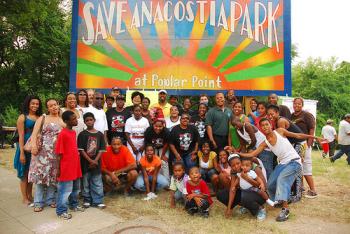 The members of ONE DC Anacostia, Ward 8 residents concerned that the toll market-rate development has taken on other parts of the District might also push low-income residents out of Southeast, won a few surprising early victories in their struggle for transparency in Mayor Fenty’s negotiations with DC United, who have been pushing to build a soccer stadium at a part of Anacostia Park known as Poplar Point. Less than a month after ONE DC Anacostia called for a more open process at a City Council hearing on the deal, Mayor Fenty announced he would seek requests from many developers. Residents proceeded to put the mayor’s commitment to a “community-led process” to the test, going door to door in the ward and interviewing over 300 residents to find out their preferences for new development. The survey results were announced at a conference for prospective developers, where the group’s members were joined by allies including DC ACORN, the DC Environmental Network and Earth Conservation Corps. Residents continue to press for equitable development at Poplar Point; Mayor Fenty has promised to pick a developer for the area in January, and a plan for the site will be assembled over the next two years.
The members of ONE DC Anacostia, Ward 8 residents concerned that the toll market-rate development has taken on other parts of the District might also push low-income residents out of Southeast, won a few surprising early victories in their struggle for transparency in Mayor Fenty’s negotiations with DC United, who have been pushing to build a soccer stadium at a part of Anacostia Park known as Poplar Point. Less than a month after ONE DC Anacostia called for a more open process at a City Council hearing on the deal, Mayor Fenty announced he would seek requests from many developers. Residents proceeded to put the mayor’s commitment to a “community-led process” to the test, going door to door in the ward and interviewing over 300 residents to find out their preferences for new development. The survey results were announced at a conference for prospective developers, where the group’s members were joined by allies including DC ACORN, the DC Environmental Network and Earth Conservation Corps. Residents continue to press for equitable development at Poplar Point; Mayor Fenty has promised to pick a developer for the area in January, and a plan for the site will be assembled over the next two years.WIN: $117 Million Affordable Housing Pledge from Mayor Fenty The Washington Interfaith Network kept Mayor Fenty to his promise as a candidate to fund 14,000 affordable housing units in four years, including at least 2,500 homes for homeless families. At two accountability sessions held in packed church sanctuaries in Southeast in July and November, Fenty promised WIN members his administration would spend $117 million a year on housing, would require that 30% of new units built on city-owned land be set aside for moderate income residents, and pledged to partner with the group to build 5,000 homes for families making between $25,000 and $60,000 a year. Many other activist groups – including Empower DC – continue to push for all city-owned property to be set aside for low- to- moderate-income residents, and many others work to expand Fenty’s commitment to include guarantees for public housing, housing choice vouchers and other subsidies.
LABOR/EMPLOYMENT
EJC: Winning Paid Sick Days for Workers
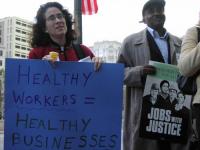 Spearheaded by the DC Employment Justice Center, the Paid Sick & Safe Days Act requires all employers of 5 or more employees to offer up to 10 paid sick days a year. The bill was developed and supported by a large coalition including national advocacy organizations, local service providers and domestic violence groups, labor unions, and community groups, which has been advocating for its passage since early 2006. At the public hearing on July 9th, more than 30 people testified in support, including low-wage workers who currently lack paid sick days. As part of the campaign, activists knocked on doors in Wards 1, 3, 5 and 7 and reached out directly to workers through unions, the EJC’s legal clinics, and by visiting workplaces. Supporters also held several public actions, including two rallies and an action at one of the breakfast sessions before a Committee of the Whole meeting. The bill was voted out of committee unanimously on December 17th, and will go to a vote in the full Council in January.
Spearheaded by the DC Employment Justice Center, the Paid Sick & Safe Days Act requires all employers of 5 or more employees to offer up to 10 paid sick days a year. The bill was developed and supported by a large coalition including national advocacy organizations, local service providers and domestic violence groups, labor unions, and community groups, which has been advocating for its passage since early 2006. At the public hearing on July 9th, more than 30 people testified in support, including low-wage workers who currently lack paid sick days. As part of the campaign, activists knocked on doors in Wards 1, 3, 5 and 7 and reached out directly to workers through unions, the EJC’s legal clinics, and by visiting workplaces. Supporters also held several public actions, including two rallies and an action at one of the breakfast sessions before a Committee of the Whole meeting. The bill was voted out of committee unanimously on December 17th, and will go to a vote in the full Council in January.ONE DC: DC Residents Design a Job Training Program ONE DC members continued to capitalize on their two-year-old agreement with the Washington Convention Center Authority and Marriott International, constructing a blueprint for a job training and hiring program that would directly address their needs as low-wage workers and provide a path to employment for over 1,000 District residents. Made up primarily of residents seeking living wage employment or with extensive experience in job training programs, DC RJP members developed a model employee-centered training program that they hope will eventually be implemented in all city-subsidized developments. With potential training partners onboard, their focus is now on implementation of the program.
SEIU Local 32BJ: Security Officers Win Union Recognition
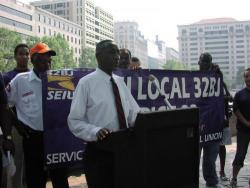 In March, after a three-year campaign involving dozens of direct actions over 1,000 security officers working for three contracting firms in downtown office buildings won union recognition with SEIU Local 32BJ. Supported for several years by DC Jobs with Justice allies, recognition paved the way for contract bargaining, which is ongoing. The workers are demanding salary increases, employer-paid healthcare, paid leave and fair grievance procedures.
In March, after a three-year campaign involving dozens of direct actions over 1,000 security officers working for three contracting firms in downtown office buildings won union recognition with SEIU Local 32BJ. Supported for several years by DC Jobs with Justice allies, recognition paved the way for contract bargaining, which is ongoing. The workers are demanding salary increases, employer-paid healthcare, paid leave and fair grievance procedures.Taxi Drivers Strike to Protect Small Businesses File this one in the “Thanks, Congress” file. Next to the blocked schools takeover referendum and the lack of a vote in Congress. Responding to a deadline imposed by Senator Carl Levin (D-MI) for the District to require time-and-distance meters in cabs, or for the mayor to publicly “opt-out” of the requirement, taxi drivers mobilized pressure on the Taxicab Commission and mayor to maintain the current zone system. Drivers, overwhelmingly self-employed recent immigrants, expressed concern that meters would allow large taxi companies to dominate the industry as they do in Northern Virginia. And a study of the effect of zones vs. meters concluded riders who take longer trips – residents of far NE/SE – pay more on average in metered cabs than with zones. Despite strong turnout from drivers at Taxicab Commission meetings on the subject, in October Mayor Fenty ordered a switch to time-and-distance meters, prompting the Taxicab Industry Group, one of three drivers’ unions, to declare a one-day strike on Halloween. Although short-lived, the strike effectively demonstrated the unity of cab drivers, who continue to advocate for guarantees to protect their independence as the switch to meters begins sometime in 2008. As 2007 came to a close drivers began a new effort to survey riders in order to prove that most are against the switch to time-and-distance meters.
Teamsters Local 922: AU Shuttle Bus Drivers Form a Union In October, American University’s shuttle bus drivers, with the support of the student-led AU Solidarity Committee, won union recognition with Teamsters Local 922. AU’s Student Senate had passed a resolution supporting the rights of campus workers to form a union, and a similar measure was slated to be introduced in the Faculty Senate as well as at the school’s board of trustees. Local 922’s Secretary-Treasurer Aaron Sawyer was quoted in StreetHeat praising the student-worker alliance, “demonstrating the effectiveness of combining coordinated student outreach, workers solidarity and media outreach.”
Union de Trabajadores (Workers Union): Winning a Multicultural Training Center
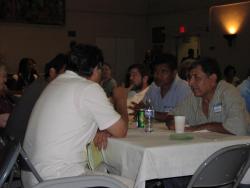 The Union de Trabajadores (Workers Union) The worker-led union of day laborers, meeting weekly alongside allies from Foundry UMC, American Friends Service Committee-DC, DC Jobs with Justice, the Mayor’s Office on Latino Affairs and others, secured a commitment from Councilmember Harry Thomas early in the year to create a multicultural training center near the Brentwood Home Depot to connect District workers with contractors, training, jobs and worker-readiness programs. The proposal has had strong support from religious and labor leaders, as well as from workforce development advocates. The workers also focused on creating decent work and job-seeking conditions. On December 15th, more than 30 community members turned out at Home Depot to counter a small demonstration by the anti-immigrant group DefendDC. The group that came out in solidarity with the workers included a dozen neighbors from Brentwood and Brookland, as well as members of the Interfaith Worker Justice committee.
The Union de Trabajadores (Workers Union) The worker-led union of day laborers, meeting weekly alongside allies from Foundry UMC, American Friends Service Committee-DC, DC Jobs with Justice, the Mayor’s Office on Latino Affairs and others, secured a commitment from Councilmember Harry Thomas early in the year to create a multicultural training center near the Brentwood Home Depot to connect District workers with contractors, training, jobs and worker-readiness programs. The proposal has had strong support from religious and labor leaders, as well as from workforce development advocates. The workers also focused on creating decent work and job-seeking conditions. On December 15th, more than 30 community members turned out at Home Depot to counter a small demonstration by the anti-immigrant group DefendDC. The group that came out in solidarity with the workers included a dozen neighbors from Brentwood and Brookland, as well as members of the Interfaith Worker Justice committee.UNITE HERE Local 25: Hotel Workers Win New Contract
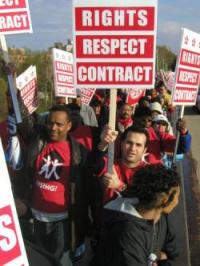 On April 12th UNITE HERE Local 25 — a union of hotel workers, laundry workers and others — kicked off their contract renewal campaign with a march of over 500 hotel workers from the Marriott Wardman Park down Connecticut Ave NW. During the contract fight they built a large campaign committee and hundreds of members received leadership training. Over a hundred members participated in each bargaining session, and in September members ratified a new three-year master hotel contract. The contract includes a $1.70 wage increase over two years, continued employer-paid healthcare coverage, progress on key demands, such as reducing housekeepers’ workloads, and a card-check provision to make it easier for workers at the new Prince George’s County National Harbor complex to join the union.
On April 12th UNITE HERE Local 25 — a union of hotel workers, laundry workers and others — kicked off their contract renewal campaign with a march of over 500 hotel workers from the Marriott Wardman Park down Connecticut Ave NW. During the contract fight they built a large campaign committee and hundreds of members received leadership training. Over a hundred members participated in each bargaining session, and in September members ratified a new three-year master hotel contract. The contract includes a $1.70 wage increase over two years, continued employer-paid healthcare coverage, progress on key demands, such as reducing housekeepers’ workloads, and a card-check provision to make it easier for workers at the new Prince George’s County National Harbor complex to join the union.Youth Action Research Group: Winning Changes to Summer Jobs Program
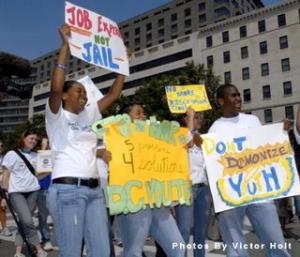 In February YARG released their action research report “The New Workforce: DC Youth Speak Out for Quality Employment Training and Job Opportunities” and developed a set of recommendations for improving the city’s summer and year-round youth jobs programs. During the Spring they met with program directors at the Department of Employment Services, the Mayor, the Deputy Mayor, and members of the City Council to discuss their recommendations. With their youth leaders mobilizing their peers to lobby the council, they convinced Carol Schwartz to hold a special Saturday hearing on the issue, which was held on May 5th. After the hearing DOES committed to a number of changes to be implemented in summer 2007, including a 24-hour hotline for youth and employers and hiring 7 new people to answer calls related to the program during business hours. The number of paid positions was increased to 11,000 for the summer, close to what YARG members had been calling for. DOES also agreed to work with YARG on an evaluation of the summer 2007 program, giving them names of participants to survey and cooperating in site visits. The group’s youth leaders are completing the evaluation of the summer program, and working on developing recommendations for an expanded year-round program.
In February YARG released their action research report “The New Workforce: DC Youth Speak Out for Quality Employment Training and Job Opportunities” and developed a set of recommendations for improving the city’s summer and year-round youth jobs programs. During the Spring they met with program directors at the Department of Employment Services, the Mayor, the Deputy Mayor, and members of the City Council to discuss their recommendations. With their youth leaders mobilizing their peers to lobby the council, they convinced Carol Schwartz to hold a special Saturday hearing on the issue, which was held on May 5th. After the hearing DOES committed to a number of changes to be implemented in summer 2007, including a 24-hour hotline for youth and employers and hiring 7 new people to answer calls related to the program during business hours. The number of paid positions was increased to 11,000 for the summer, close to what YARG members had been calling for. DOES also agreed to work with YARG on an evaluation of the summer 2007 program, giving them names of participants to survey and cooperating in site visits. The group’s youth leaders are completing the evaluation of the summer program, and working on developing recommendations for an expanded year-round program.EDUCATION & SCHOOLS
Fighting the Mayoral School Board Takeover In January, in response to Mayor-Elect Adrian Fenty’s announced proposal to take control of DCPS — neutralizing the oversight of the city’s first elected body under home rule, the Board of Education — multiple anti-takeover groups emerged, led by students, parents and teachers. Young leaders from Youth Education Alliance mobilized their members to City Council hearings, and schools activists with Save Our Schools organized teach-ins, rallies, even a demonstration at Mayor Fenty’s house. Mary Spencer, a leader with DC ACORN, filed a legal challenge and, together with members of nearly a dozen other education reform organizations, set out to collect thousands of petition signatures to put the takeover to a citywide vote. Mayor Fenty appealed the referendum’s initial approval, and Superior Court Judge Lynn Leibovitz agreed that because Congress had approved the takeover the measure was invalid. Ms. Spencer spoke for many when she was quoted in the Post as being disappointed, but knowing that the legal challenge had sent a message to the mayor. “The people have spoken,” she said. “They want to have a say. They want to have a vote.” As the lights went out on 2007 schools activists, unions and others came together again to oppose a subsequent mayoral initiative to lay off hundreds of DCPS central office employees, and to close down 27 schools.
POLICE ACCOUNTABILITY
DC Trans Coalition: New Rules for Police Conduct Coming off a victory last December in which DC’s transgender activists won the strongest transgender anti-discrimination rules in the country, this summer members of the DC Trans Coalition developed draft policies to help DC’s police, corrections and fire/EMS departments better serve and protect transgender people. In October the group won its first victory in the new campaign, successfully convincing Chief Cathy Lanier to issue an order requiring police to refer to transgender arrestees by their preferred gender, and allowing them to identify the jail population with which they should be housed, again setting a new nationwide standard on the issue.
FLY: Youth Know Your Rights Trainings & Police Accountability The young leaders of Facilitating Leadership in Youth had a busy 2007, publishing a “Know Your Rights” handbook, designing and leading ten Know Your Rights workshops for 225 youth across the city, and beginning a police accountability program. The police accountability work included surveying 550 youth on their feelings on police and police harassment and compiling the results into a report. The survey results and policy recommendations are being compiled for a report to be released in early 2008 in partnership with the Justice 4 DC Youth Coalition’s “Prison to College Pipeline” program.
Justice for DeOnte Rawlings, Jena 6, Megan Williams On September 17th, 14-year-old DeOnte Rawlings was killed by an off-duty MPD officer. This tragedy sparked an outcry in Southeast, prompting Rawlings family members and residents across the city to demand justice. Many activists, together with concerned clergy and groups like the Hip Hop Caucus organized demonstrations at Police Headquarters and vigils in DeOnte’s neighborhood. Local actions were held simultaneously against the Justice Department’s refusal to intervene in the Jena 6 case, and to demand justice for Megan Williams – one such action, the “Be Bold Be Brave Wear Red” national day of action on Oct. 31st to highlight the violence experienced by women of color, was spearheaded by a DC activist. Three months after DeOnte’s death the US Attorney’s Office is still conducting an investigation.
HEALTH
Opposing an HPV Vaccine Requirement In March the City Council voted to require that all girls entering the 6th grade receive HPV vaccinations by fall 2009. Defying dozens of witnesses who testified against the measure at public hearings and rallies at the Wilson Building, pointing out the lack of research on the vaccine’s side effects and overall safety, the Council gave an early holiday present to Merck, the vaccine’s manufacturer, which lobbied for the mandate. Many parents and youth advocates continued to rally opposition to the measure, which received a boost with the election of Councilmembers Yvette Alexander and Muriel Bowser two months later. At the urging of many residents, both women introduced a measure to repeal the vaccine requirement in September, and activists continue to lobby other councilmembers to endorse it.
Do you have any victories to add? Send them to: willisa [at] gmail [dot] com
AROUND THE BLOCK: Neighborhood Victory Stories
VICTORY STORY: ONE DC Members, Shaw Residents Get a Guarantee The Shaw neighborhood has long been considered historic – home for decades to Black civil rights activists, artists and intellectuals. This year it added to its historic status by becoming the first neighborhood in recent times to be guaranteed new, permanently affordable housing as a result of organizing by low-income residents. Although in the works now for five years, ONE DC members had been held up by a legendary bureaucracy at the city’s public-private development agency; one of the group’s leaders estimates she had met with five different agency representatives in three years.
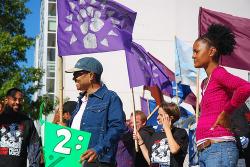 Residents had high hopes for the new administration, which had promised to cut through red tape to create affordable housing. But ONE Right to Land members were unsuccessful in their repeated attempts to schedule a meeting with the Deputy Mayor’s Office to discuss implementation of an agreement won under the Williams Administration, and were told by a source within Fenty’s office that the mayor was reconsidering many such deals. Frustrated by years of delays, and having repeatedly proved the commitment of neighborhood residents to the project, the group’s members decided they had no choice but to confront Mayor Fenty to demand what had already been agreed to under the previous mayor: a guarantee of $7.8 million to fund dozens of permanently affordable apartments.
Residents had high hopes for the new administration, which had promised to cut through red tape to create affordable housing. But ONE Right to Land members were unsuccessful in their repeated attempts to schedule a meeting with the Deputy Mayor’s Office to discuss implementation of an agreement won under the Williams Administration, and were told by a source within Fenty’s office that the mayor was reconsidering many such deals. Frustrated by years of delays, and having repeatedly proved the commitment of neighborhood residents to the project, the group’s members decided they had no choice but to confront Mayor Fenty to demand what had already been agreed to under the previous mayor: a guarantee of $7.8 million to fund dozens of permanently affordable apartments.
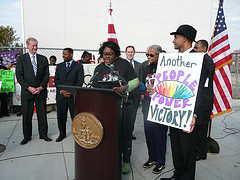 With high hopes they announced their intention to occupy the Executive Suite of the Wilson Building until they had this guarantee in writing, on a Tuesday in June. Within hours of sending an email action alert to ONE DC supporters, representatives of Deputy Mayor Neil Albert were calling, assuring ONE DC members they would be more than happy to meet. After negotiations throughout that week the group’s leaders agreed to halt their plans until after a meeting with the Deputy Mayor a day before the planned occupation. At this meeting Albert confirmed the administration’s support for the project, and asked ONE DC members to draft a letter of commitment that he would sign.
With high hopes they announced their intention to occupy the Executive Suite of the Wilson Building until they had this guarantee in writing, on a Tuesday in June. Within hours of sending an email action alert to ONE DC supporters, representatives of Deputy Mayor Neil Albert were calling, assuring ONE DC members they would be more than happy to meet. After negotiations throughout that week the group’s leaders agreed to halt their plans until after a meeting with the Deputy Mayor a day before the planned occupation. At this meeting Albert confirmed the administration’s support for the project, and asked ONE DC members to draft a letter of commitment that he would sign.Victorious, one more small win achieved on the way to the goal of new housing at 7th St and R St NW, the Shaw residents who won this victory had one last piece of business to attend to: they had promised to visit the Deputy Mayor that Tuesday, and so they did, with many campaign members who had been unable to attend the day before making the trip down to the Wilson Building, surprising weary staffers who remarked, “Back again??” The ONE DC members who made the trip thanked the staff for responding to resident demands, and served a gentle reminder. “We’re still waiting.”
VICTORY STORY: Tenants Unite to Defeat Tenacity Group By Farah Fosse, Latino Economic Development Coalition In January 2006 Tenacity Group, the condo people, sent letters to approximately 1000 families living at 19 buildings across DC proposing to convert their affordable rental housing into condominiums. Residents, and DC government officials, felt the letter was written to mislead tenants into believing they had to move out. In response, residents began organizing by talking to their neighbors, forming tenant associations and working with community organizations – including Housing Counseling Services and the Latino Economic Development Corporation (LEDC) – to learn their rights and options. As residents became aware that tenants at other buildings with their same owner were also being threatened by condo conversion they decided to work together to organize and strategize.
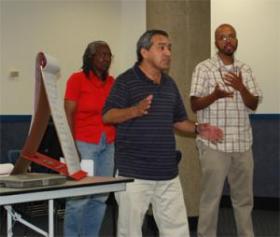 In February, over 100 residents met for a community meeting – held in English and Spanish – jointly organized by LEDC, Empower DC and various tenant associations at a church in Shaw. Representatives of Tenacity also showed up at the meeting but were shouted out by chants of “leave now” from the tenants. In this meeting residents learned from each other about their rights and committed to working together to oppose the condo conversion proposals, preserve their housing as affordable and prevent displacement. One tenant association, the Norwood Tenant Association from Logan Circle, even presented a bilingual skit called “Buy Out or Rip Off” to educate other residents on the risks associated with accepting money to move out of their building.
In February, over 100 residents met for a community meeting – held in English and Spanish – jointly organized by LEDC, Empower DC and various tenant associations at a church in Shaw. Representatives of Tenacity also showed up at the meeting but were shouted out by chants of “leave now” from the tenants. In this meeting residents learned from each other about their rights and committed to working together to oppose the condo conversion proposals, preserve their housing as affordable and prevent displacement. One tenant association, the Norwood Tenant Association from Logan Circle, even presented a bilingual skit called “Buy Out or Rip Off” to educate other residents on the risks associated with accepting money to move out of their building.During the upcoming months residents met monthly under the banner of their newly formed coalition “the DC Tenants Rights Alliance.” Residents found that though they lived in diverse buildings across the city they shared common problems, not just of condo conversion, but also rising rents, deteriorating buildings, discrimination and negligent maintenance. They decided to work together for immediate and long-term change. Through the monthly meetings tenants strategized around forming tenant associations, increasing membership, getting improved maintenance and learned about their options for preserving their buildings as affordable in the long-term.
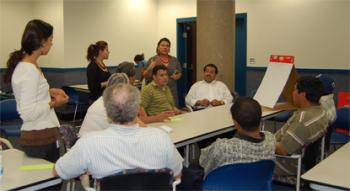 Tenants from some of the more organized tenant associations went to meetings at other buildings to help with organizing efforts. The associations organized for improved maintenance, refused to pay rent and even organized a Lemonade Sit In (where tenant association member sat in the lobby, handed out lemonade and talked with their neighbors and the press) to protest an un-repaired elevator. In September, the Ward 1 DC Tenants Rights Alliance members and LEDC hosted a “Housing Reality Tour” to give policy makers, community leaders and the press a glimpse into the reality of poor living conditions present in multifamily apartment buildings across the city. Tenants also highlighted successes they have had in getting repairs and preserving affordable housing and promoted policy recommendations that would allow the city to become more proactive in protecting tenants’ right to safe and decent living conditions.
Tenants from some of the more organized tenant associations went to meetings at other buildings to help with organizing efforts. The associations organized for improved maintenance, refused to pay rent and even organized a Lemonade Sit In (where tenant association member sat in the lobby, handed out lemonade and talked with their neighbors and the press) to protest an un-repaired elevator. In September, the Ward 1 DC Tenants Rights Alliance members and LEDC hosted a “Housing Reality Tour” to give policy makers, community leaders and the press a glimpse into the reality of poor living conditions present in multifamily apartment buildings across the city. Tenants also highlighted successes they have had in getting repairs and preserving affordable housing and promoted policy recommendations that would allow the city to become more proactive in protecting tenants’ right to safe and decent living conditions.At the present time many of these buildings are for sale and tenants are exercising the opportunity to purchase their buildings as limited-equity cooperatives. These tenant associations are in a great position since they are already aware of their rights and have experience working together and organizing for change.
VICTORY STORY: Hear Mt. Pleasant Stops an Eviction, and Reframes the Debate Heading into November, the activists of Hear Mt. Pleasant had achieved several victories on the way to their goal of eliminating an oppressive ban on live music that disproportionately affects Latinos. They dedicated months of work to building awareness of the issue and leadership among residents and business owners, holding workshops, conducting neighbor-to-neighbor outreach, gathering 1,000 signatures from Mt. Pleasant residents opposing the ban and sponsoring a live music series in Lamont Park.
But their adversary – the Mt. Pleasant Neighborhood Alliance, whose leaders forced coercive agreements on neighborhood restaurants thanks to an archaic quirk in alcoholic beverage control laws – had been successful in spinning the story as one of two equally well represented and ethical groups civilly advocating separate visions for the neighborhood.
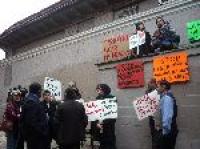 The truth became clear on November 19th, the day the DC Department of Transportation attempted to tear down Don Juan’s trash enclosure, which would effectively shut the restaurant, following a frivolous complaint filed by the MPNA’s Laurie Collins. The MPNA head has throughout her time in the neighborhood made a target of restaurants on the block, and has retaliated this year against HMP participants like Don Juan’s.
The truth became clear on November 19th, the day the DC Department of Transportation attempted to tear down Don Juan’s trash enclosure, which would effectively shut the restaurant, following a frivolous complaint filed by the MPNA’s Laurie Collins. The MPNA head has throughout her time in the neighborhood made a target of restaurants on the block, and has retaliated this year against HMP participants like Don Juan’s.Alerted to the illegal demolition in progress, HMP activists organized a quick sit-in and called Councilmember Jim Graham’s and Mayor Fenty’s staff to the scene, preventing the enclosure’s removal. As HMP had planned a rally for that same night, friends of Don Juan’s continued to mobilize supporters throughout the day, with DJs from Radio CPR and other Latino stations spreading the word.
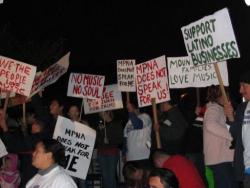 By the time of the rally over 300 people had massed in front of the Mt. Pleasant Library, dancing to live music courtesy of local musicians. Mayor Fenty later arrived to attend the MPNA meeting, and was confronted on his support for Collins and the MPNA. HMP supporters attended the meeting, where Fenty refused to call on them even though it was a public meeting on neighborhood safety.
By the time of the rally over 300 people had massed in front of the Mt. Pleasant Library, dancing to live music courtesy of local musicians. Mayor Fenty later arrived to attend the MPNA meeting, and was confronted on his support for Collins and the MPNA. HMP supporters attended the meeting, where Fenty refused to call on them even though it was a public meeting on neighborhood safety.There was no mistaking the score the next day: HMP had shown itself to be the legitimate voice of Mt. Pleasant residents on the issue, and Collins’ outrageous actions, and subsequent refusal to let many speak at a public meeting, revealed MPNA’s real agenda. This was especially crucial for the HMP campaign since one of their strategies relies on having “standing,” or credibility, in front of the alcohol regulation board. Their quick, creative, and tempered response to the MPNA’s provocations exposed the group’s shallow motives and lack of local support, particularly among Latinos.
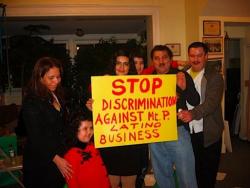 If anyone at the Alcoholic Beverage Control Board watched the news that night, they know who has standing, and know the precarious place they as decision-makers occupy – Laurie Collins once served on the board, and after the 19th, giving her group standing could only be justified as a political favor. Just as important, Councilmember Graham and Mayor Fenty were publicly called out for their support for the MPNA, giving both the political cover they need to distance themselves from the group. HMP continue to prepare for the long-delayed hearing before the ABC Board, currently scheduled for February.
If anyone at the Alcoholic Beverage Control Board watched the news that night, they know who has standing, and know the precarious place they as decision-makers occupy – Laurie Collins once served on the board, and after the 19th, giving her group standing could only be justified as a political favor. Just as important, Councilmember Graham and Mayor Fenty were publicly called out for their support for the MPNA, giving both the political cover they need to distance themselves from the group. HMP continue to prepare for the long-delayed hearing before the ABC Board, currently scheduled for February.Do you have any stories to add? Send them to: willisa [at] gmail [dot] com
